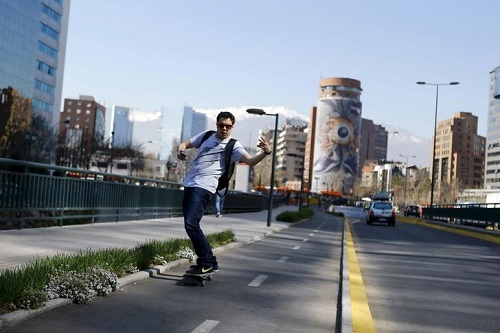The world cannot resolve today's development challenges with purely national approaches. We need to complement them with local approaches, too. We live in an era of enormous transformations, in which our traditional political structures and forms of democratic participation must adapt. That means casting a bigger focus than ever on the important role of local power and communities. Local territories and cities are essential players in the pursuit of a just and sustainable development, and their voices must be given more sway in international forums.
On all continents, the local level of power has become a driver of social innovation and public policy, showing promising results in challenging areas such as social inequality, environmental protection, multicultural coexistence and democracy. In Santiago, there are policies, actions and projects that have stood out as being exemplary; many have been emulated at national level and are applicable to the realities and experiences of other countries, too.
Take waste management, for instance. Refuse is no longer a high-cost nuisance, but a resource for generating energy and wealth. In Santiago we are pursuing a waste-conversion program that goes beyond the usual "green" recycling spots in public space to cover every step of the waste management process, including waste separation at home. It implies a cultural change and, for it to work, requires the support of entire communities.
The same can be said of urban mobility policies. Cities around the world are changing their transport systems and how they move about, leading to improvements in social equality, greenhouse gas emissions and the quality of urban life generally. Our Downtown Plan initiative is a case in point, by transforming how people use the streets in downtown Santiago. Through the plan, we have shown how favoring pedestrians, cyclists and public transport helps reduce traffic congestion and pollution. It is a valuable step towards our goal of providing a kinder, fairer city, where both rich and poor can move, work and live in dignity and security.
More than half of the world's population lives in cities, but in Latin America that figure soars to 80% and in Chile to 90%. This gives immense importance to urban policy making, both to help us understand the present and anticipate the future. International development forums should recognize this fact, as the OECD is doing, thanks to its work on promoting good governance at every level.
After all, diverse forms of local democracy in particular can be innovative and enriching, both for political participation and governance, and for people's lives. By giving citizens more than a voice and actually encouraging them to participate in decisions about how to invest resources, for instance, municipalities build solidarity and cultivate togetherness. This is the approach we have adopted in Santiago, through our public consultations, participatory budgets, and other forms of social involvement.
The world of the 21st century challenges policy makers to involve citizens in the decisions that matter. What kind of development do we want to strive for? How can we take care of our planet and stop permanent damage to our environment? How can we reach our goals? What must each citizen do to contribute, and what should they expect in return?
Municipalities and local spheres hold the answers to these key questions. The inclusion of local actors in OECD discussions represents progress. It is an opportunity to bridge the gap that too often divides the citizens of many countries from their national and international political institutions. In Santiago we are determined to help bridge that gap for good.
This post is part of a series produced by The Huffington Post and the OECD, in conjunction with the OECD Forum (Paris, May 31-June 1). The OECD Forum is a major international conference, held at the OECD headquarters in Paris, where policies and ideas are shared between governments, business, civil society and academia. This article first appeared in the OECD Yearbook. For more information on the Forum, visit www.oecd.org/forum.
